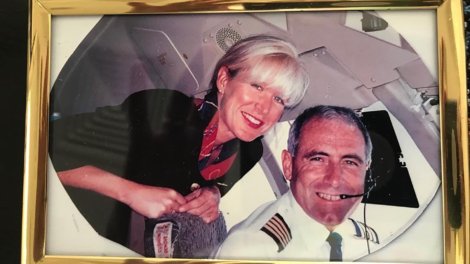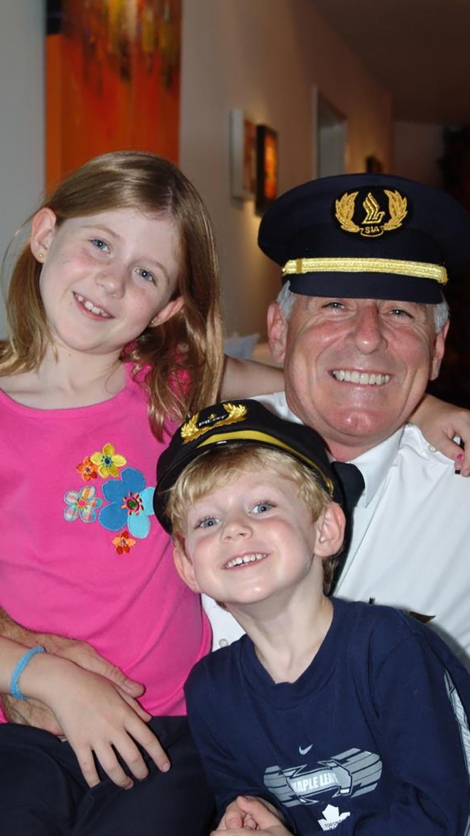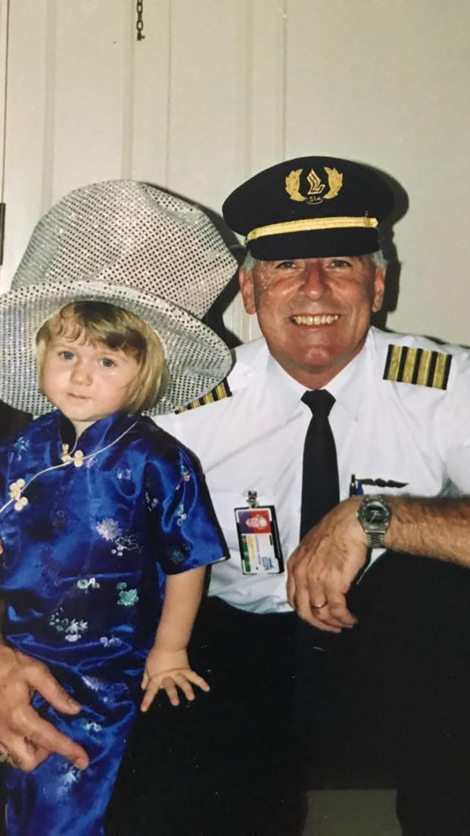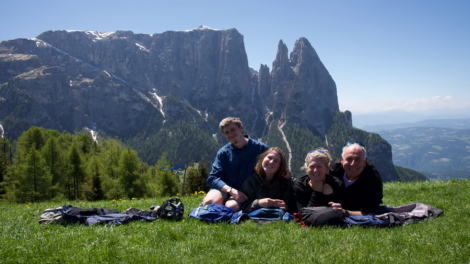Nothing really prepares you for the moment when you learn that your family’s financial future is about to take a 180, especially in the midst of a pandemic. For me, that moment came at the end of July.
I was in my room, finishing up one of my weekly lecture videos for a summer course. Maman and Papa had just returned from Montréal where they were interviewing contractors for their soon-to-be forever home house project.
I remember hearing an anxiousness in their voices when my brother and I called them while they were on the road. They were rushing home to prepare for a phone call that Papa was expecting later that day.
Working part time at his job as a simulator instructor due to the pandemic’s restrictions, Papa was feeling very positive about the news that this phone call could bring. After being laid off and then called back part time in April, we believed that this would be the phone call inviting him back to work full time.
With more and more businesses beginning to open up again and physical distancing measures seeming to be under control, it was only time before Papa got called back.
After my lecture, as I walked toward the door to the back patio to join the rest of my family, I noticed the tears wiped off on my mother’s face and the redness in her cheeks. Papa wasn’t with them. I didn’t get a chance to ask what was wrong before Maman shared the news.
“Papa just lost his job, permanently,” she said.
I remember feeling like my heart had dropped to the soles of my feet. Everything went blurry in those first few seconds after those words hit my ears. As Papa came through the back door to the terrace, I slowly walked up to him and gave him a hug. My mind racing and my head spinning, the only words that I could find myself to say were, “I’m so sorry. I love you.”
Despite the cold drizzle coming from the rain that day, my family and I sat outside, sheltered under the umbrella on our dining table with some candles lit at the centre. We sat there in silence, but it was very clear what all of us were thinking: “What do we do now?”
The look on my parents’ faces as we quietly pondered this question together is one that I will never forget.

When Maman and Papa moved back to Canada from Abu Dhabi after 25 years, they were excited to start the next chapter of their lives together. Papa had been a pilot for almost 48 years and had recently gotten a job as a simulator instructor, which he was truly enjoying.
Papa has always been passionate about the adventures that came with flying and the opportunities that it gave him to see the world with his family. His position as a simulator instructor allowed him to share his love for flying with young cadets all while staying on the ground.
Being able to go to work in the morning and return in the afternoon to join Maman and the cats for dinner was something that he hadn’t always been given the chance to do before. He was excited to be able to be there indefinitely for birthdays, anniversaries, holidays, and graduations.
As a family, we were making the most of our first year in Canada all together. We enjoyed the beautiful colours of fall, ice skating on the frozen lake outside of our cozy little cottage, and the comforting feeling of knowing that we were finally all in the same time zone.
For the first time since moving to Canada, everything in my life seemed to be lining up. But by the end of March, both my mother and father were laid off from their jobs.
Like many other Canadians, Papa quickly applied for Unemployment Insurance (UI). My mother didn’t qualify for UI or the Canadian Emergency Response Benefit (CERB) because she hadn’t worked for a long enough period before being laid off. Needless to say, any money that we could pull together was something.
We were happily surprised when, in the middle of April, Papa got called back to work part time. Getting the call that morning felt like an early birthday present to me. We told ourselves that this was better than nothing.
My father kept saying that he had a really good feeling about the possibility of being called back full time by the end of June or the beginning of July. That way, my brother and I could continue with our studies, the house renovations would be completed, and we would all be able to find some peace of mind.
But instead of getting the call to go back to work, the night under the drizzly sky at our dining table hit us. In July, he was completely terminated. That news hit us all like a fast-moving freight train, and we’ve been trying to recover ever since.
Since August, Papa has been able to pick up a factory job working on an assembly line and putting together ventilators. He works 40 hours a week, from 2:00–10:00 pm. At the age of 64, Papa has found this job to be physically demanding at times, as he stands up for most of the day. This was a total and unprecedented shift for him.
While Papa likes the group of people that he works with, the emotional toll of everything that has happened still lingers prominently. His current job is a temporary contract that will take him only to December.
With COVID-19 cases rising daily, the beginning of a second wave in Québec, and new restrictions in place, it is still uncertain when many others like Papa will be able to go back to their former jobs. Our family’s financial situation is now in survival mode.

While money was never an easy topic in our family, it is a sensitive one now more than ever. How to meet financial commitments for my brother’s and my university fees, rent, the construction of the new house, and other accumulating bills are the biggest questions.
Having only moved back to Canada less than a year ago, this was surely not the beginning of the next chapter of their lives together that my parents had prepared for. This thought brings me to tears every time I think about it.
As a 22 year old who has lived under her parents’ wings for financial security her whole life, I, along with my brother, wanted to support our mother and father in the same way that they had done for us. To do this, we needed to support ourselves by picking up extra shifts, and, in my case, looking for a second job.
I feel overwhelmed. There are many moments when the question of what could happen next consumes me and leads me to think of the worst possible outcomes. However, knowing that I am doing everything I can to make this work for my family eases the blow in the moments when I feel lost and helpless.
The stress of finding a second job that matches my schedule with school, work, and other commitments has been very exhausting and time consuming. It’s been the cause of many sleepless nights and has significantly delayed my start to my final year at U of T. With money at the top of my priority list, or the lack thereof, I found it challenging to think about anything else, let alone focus on school and my job.
The truth was that the Canada Emergency Student Benefit (CESB) program that my brother and I had been receiving over the summer wasn’t going to be enough to cover the looming costs that stood before us. We knew this from the very start when Prime Minister Justin Trudeau first announced the program back in April.
While the CESB may have been a move in the right direction for students struggling to find a summer job in May, assuming that set monthly payments of $1,250 was enough for all students was definitely wishful thinking. Let me break it down.
In order to qualify, your potential earnings were capped at $1,000 a month. The potential $2,250 that students could be earning each month was barely enough given the expenses that students face each year.
Take the average university tuition fees of $6,610 for domestic students and add the costs of other necessities. The cost of textbooks and school materials can run up into the hundreds, housing can cost on average $2,063 for a one bedroom unit in Toronto, and groceries can cost over $200 a month. CESB simply wasn’t sufficient.
I quickly realized that for some privileged students, CESB seemed to be a ‘free’ revenue stream. However, this wasn’t the case for many Canadian students who worked and continue to work to support themselves and their family.
These feelings are new to me, but they aren’t new to many. The unemployment rate in Canada was 10.2 per cent in August 2020. Over 14 per cent of Canadians have low incomes. Students in university who have low incomes or whose lives have been financially disrupted by the pandemic are in a precarious situation, as we have to balance deadlines for assignments and bills.
As I look for a second job on top of accumulating university obligations and graduate school applications, I don’t know how I will be able to manage these responsibilities and two jobs while prioritizing my mental health. I think about this often.
There have been many mornings when I’ve woken up in pure disbelief, hoping that this was all just a bad dream. I can’t imagine my future anymore, and my financial insecurity makes me feel like I’m constantly treading water, trying to keep my head above the surface just enough so that I don’t plunge to the bottom.

In moments of self-doubt, scrambling to pay bills, I find it very easy to begin to lose all hope in whether my goals for my future are even attainable anymore.
With this sense of hopelessness comes anger. There are people truly suffering, who have lost their jobs and are living with severe uncertainty. We are no longer on the cusp of a second wave; it has already begun. There are currently four million Canadians still in need of assistance from CERB.
Québec is now experiencing a second wave of COVID-19 cases. Considering that my father works on a factory floor, I can’t help but worry for his safety.
Then, when I watch news stories of anti-maskers protesting for their ‘liberties,’ crowded beaches and boardwalks in Vancouver, and embarrassingly large house parties and gatherings across Canada, it feels like salt in the wound. This selfishness and recklessness has angered me more than anything.
It felt like everyone else was blind to how much damage the pandemic had done to people’s lives. Even though I knew that this wasn’t the case, I couldn’t help but feel this way.
Sometimes, I used to resent the fact that not everyone had been affected by the pandemic like me. Seeing people live their lives relatively unchanged as I watched my family struggle through some of the most challenging times in our lives, made me feel alone and powerless.
“Ça va bien aller.” Everything will be all right. There are still days when this saying feels like a punch in the gut, but I quickly realized that being mad at the world wasn’t going to change anything.
Other days, the saying uplifts my spirits. That’s the thing that nobody tells you about dealing with a pandemic: while words of encouragement may make you want to scream sometimes, they can also be a powerful way to gain strength in unity, knowing that you are not alone.
Even in my darkest moments, the strength of my family keeps me going. Knowing that my father is walking onto that factory floor five days a week, that my mom is learning how to navigate a new job online, that together we are learning how to make the best of our situation, reminds me that now is absolutely not the time to give up.

When I think back to when we first received the news of my father’s termination in late July, what stands out to me isn’t so much the sadness and shock that we all felt in those moments. Rather, it’s what happened next.
That night, my brother prepared the most delicious chicken parmesan that you’ve ever tasted, and we shared a beautiful family meal outside under the stars. The conversation during dinner was not oriented around our family’s news. Instead, we spent the evening reminiscing about our fond memories of the summer of 2019, during our last family vacation hiking the Dolomites in Italy.
There was one day in particular we remembered most about that trip. It was one of our last days there. We had packed some baguette sandwiches with prosciutto, brie, and mustard, hoping to find the perfect spot for lunch.
After several hours of cycling through leftover snow and mud, we eventually found our way to the cliff of a mountain. The view was absolutely breathtaking. We were starstruck by the beauty. After we each ate our sandwiches and enjoyed a small siesta on the grass, Papa got us all together to take a family photo before we began our descent down the mountain.
One year later, instead of wallowing in the news of how our lives were about to change, sharing stories of family memories over a delicious candlelit dinner reminded us of what would never change: the memories that we’ve shared, and how much we love one another. Just like the majestic mountains of the Dolomites, no matter what this pandemic would throw at us, our family would be unbreakable.
As we sat there at the dinner table exchanging stories from that holiday, I remember Papa taking my mother’s hand as he shared how much that day meant to him. And with another squeeze of my mother’s fingers, Papa reached out his other hand to me and my brother and said, “We’re going to be okay.”
Editor’s note (October 6): This article has been updated to correct the age of the writer’s father.


